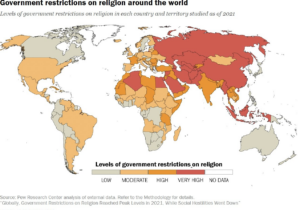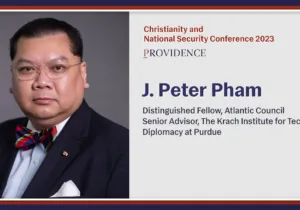This essay originally appeared at Philos Project, the co-publisher of Providence. To read it there, click here.
—
Across the globe, assaults on religious freedom abound. Rohingya Muslims are fleeing brutal ethnic cleansing by the Burmese government. Years of war and genocide at the hands of ISIS have decimated the ancient Christian population in Iraq—from 1.5 million in 2003 to fewer than 250,000 today. Pakistani blasphemy laws threaten the lives and freedom of innocent religious minorities. In China, the government routinely shuts down underground churches. Saudi Arabian textbooks teach school children hate and intolerance toward the “unbeliever,” specifically Christians, Jews, Shiites, Sufis, Sunnis, Hindus, atheists and others.
In the United States of course, freedom of religion is the first freedom, enshrined in the First Amendment of the Constitution and foundational to the very origin and existence of the nation. It follows that religious freedom also would animate U.S. foreign policy—except oftentimes it does not.
The International Religious Freedom Act of 1998 (IRFA) created a framework for advancing religious freedom as a foreign policy imperative. It was intended to strengthen U.S. advocacy on behalf of individuals persecuted in foreign countries on account of religion. Key to that effort was the creation of an Ambassador-at-Large for International Religious Freedom, to be nominated by the president and confirmed by congress.
To date there have been four ambassadors, and congress is on the verge of confirming a fifth, Kansas Governor and former U.S. Senator and Congressman Sam Brownback. Each ambassador has made incremental advancements in IRF policy, yet even with the IRFA mandate, religious freedom issues have remained, in large part, of secondary importance to other foreign policy objectives.
“No administration has seen IRF policy as a national security imperative. There is no national security strategy to advance religious freedom in U.S. foreign policy,” wrote Thomas F. Farr of the Religious Freedom Institute and Dennis R. Hoover of the Center on Faith & International Affairs in a recent policy brief. “There is insufficient coordination on IRF policy among the various U.S. agencies with allied foreign policy responsibilities.”
Farr and Hoover also contend that prior administrations have invested too little in the IRF mission. “The IRF Ambassador needs increased resources and greater authority in advancing religious freedom in key areas around the world.”
Indeed, in terms of funding and attention, many would argue that IRF initiatives and priorities have received short shrift from past administrations. President George W. Bush, for example, did not nominate an ambassador-at-large for the first ten months of his first term, and President Obama waited nearly a year and half to the fill the position.
By contrast, President Trump has acted swiftly, nominating Gov. Brownback in July, just six months into his term. Gov. Brownback appeared before the Senate Committee on Foreign Relations October 4, and is awaiting formal confirmation.
Gov. Brownback is lauded as a principled and authoritative voice for international religious freedom. While in the Senate, he spoke out against atrocities committed against Christians in the Sudan, pushed for passage of the Darfur Peace and Accountability Act in 2005, sponsored a resolution condemning persecution of the Baha’i minority in Iran, and was instrumental in affirming the passage of IRFA.
In written testimony at his Senate hearing, Gov. Brownback said, “Religious freedom is a fundamental right of every human no matter where they live, who they are, or what they believe. It is the right to do with your own soul what you choose, without interference of any government or group.”
He added that, more than just a moral imperative, “promotion of international religious freedom is in our national interest, and it directly supports national security priorities including the defeat of ISIS and other violent extremist groups.”
While Brownback’s passion and pedigree may be the magic combination needed to elevate the importance of religious freedom within the halls of the State Department, concerns persist that the issue remains an ugly stepchild among other foreign policy directives. The possibility of bureaucratic sidelining is real and will demand pushback.
“Last year, Congress passed the Frank R. Wolf International Religious Freedom Act, which among other things elevated the position of [ambassador-at-large] internally within the State Department so that it now is, by statute, required to report directly to the Secretary, which was designed to combat years of the position and the issue being relegated to a secondary concern rather than being fully integrated into U.S. foreign policy,” noted Sen. Marco Rubio at Gov. Brownback’s confirmation hearing.
Referencing an August 2017 letter from Secretary of State Rex Tillerson to Sen. Bob Corker, Chairman of the Senate Committee on Foreign Relations, Rubio added, “Secretary Tillerson has informed the Senate of his intent to have this role report to the Under Secretary for Civilian Security, Democracy, and Human Rights. That is not the intent of the law, and we would view that as in direct violation and contradiction of the law that was passed.”
It is unlikely that congress will reject Gov. Brownback’s nomination. The greater challenge for future Ambassador Brownback likely will be the navigation of a State Department undergoing dramatic budget cuts and restructuring, while also carving out a meaningful position within an administration whose self-proclaimed foreign policy approach is that of principled realism.
If confirmed, Gov. Brownback will be the first ambassador to also have held elective office. His knowledge of Capitol Hill culture and his demonstrated acumen for negotiating with foreign governments may prove to be the very recipe needed to fully incorporate religious freedom into the broader foreign policy conversation. He has pledged to fully integrate IRF into security strategies and strategic planning for a comprehensive whole-of-government approach.
“Time is short,” concluded Gov. Brownback at his hearing. “Every passing day finds more people persecuted, imprisoned, tortured and even killed for simply practicing their innermost convictions. We as Americans must stand strong for this first freedom or we will see the world spin into increasing conflicts and violence.”
—
Erin Rodewald is a Los Angeles-based strategist, writer and researcher/editor specializing in foreign policy, international relations and American politics. With more than 20 years of communication experience, she has served as the press secretary for the president of the Los Angeles City Council and has provided strategic public relations council for public affairs, business-to-business and high tech clients. Erin served on the team that organized and executed the international events and initiatives commemorating the Ronald Reagan Centennial Celebration. She is the co-owner of a high tech public relations firm and holds an MPP from Pepperdine University. Follow Erin on Twitter @EDRodewald






